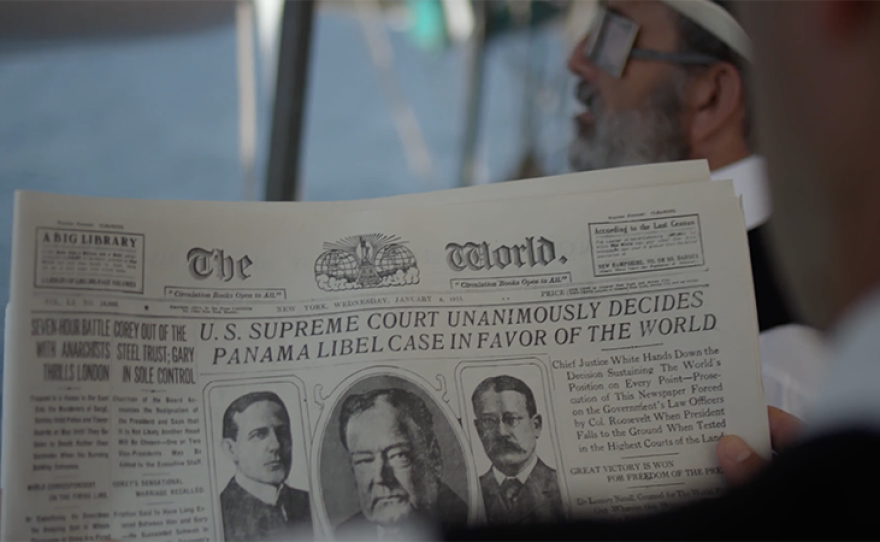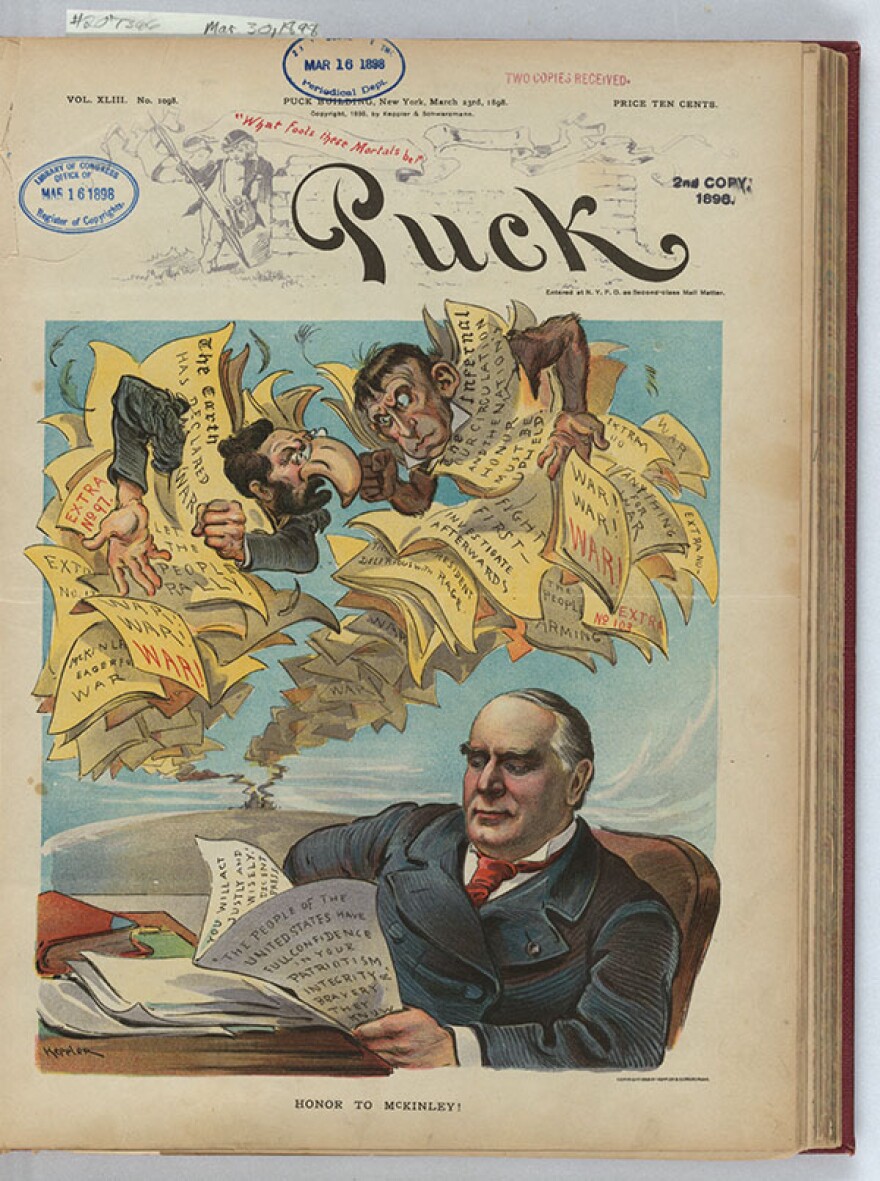Discover the man behind the Pulitzer Prizes — journalist, media mogul and champion of a free press.
AMERICAN MASTERS “Joseph Pulitzer: Voice Of The People” explores the remarkable man behind the prestigious prizes. A Jewish immigrant from Hungary, Joseph Pulitzer began as a gifted journalist before becoming a successful publisher and businessman.
Pulitzer was famous in his own time for his outspoken and cantankerous editorial voice and his newspapers’ striking illustrations, visual style, national circulation and financial success.
Against the context of America’s explosive growth as a world force during the Gilded Age, Pulitzer emerges as the country’s first media titan, reshaping the newspaper to bear witness to and even propel that transformation.
Joseph Pulitzer championed what he regarded as the sacred role of the free press in a democracy.
At the end of Pulitzer’s life, President Theodore Roosevelt sued him for “criminal libel,” citing the ongoing investigation of potential corruption in the building of the Panama Canal.
Pulitzer’s little-known Supreme Court victory in 1911 established important precedent for the First Amendment right to free speech and resonates strongly in today’s fraught political environment.
Narrated by Adam Driver, the documentary tells the story of Pulitzer’s life and accomplishments through a combination of archival footage, reenactments and interviews with authors, journalists and scholars.
Liev Schreiber is the voice of Pulitzer. Tim Blake Nelson is the voice of Roosevelt and Rachel Brosnahan is the voice of investigative journalist Nellie Bly.
Notable Film Interviewees:
- Nicholson Baker, co-author with Margaret Brentano, “The World on Sunday”
- Daniel Czitrom, Professor of History, Mount Holyoke College; author, “New York Exposed”
- Chris Daly, Professor of Journalism, Boston University; author, “Covering America: A Narrative History of a Nation’s Journalism”
- James McGrath Morris, biographer, “Joseph Pulitzer: A Life in Politics, Print and Power”
- David Nasaw, Professor of History, The Graduate Center, CUNY; author, “The Chief: The Life of William Randolph Hearst”
- Nancy Tomes, Professor of History, Stony Brook University; author, “Remaking the American Patient”
- Andie Tucher, Professor of Journalism, Columbia University; author, “Misinformed: A History of Fake News in America (2020)”
Noteworthy Facts and Themes:
Joseph Pulitzer as entrepreneur and innovator
- Speaking little English, Pulitzer came to America during the Civil War as a Union Army recruit. Although he arrived in St. Louis penniless, within a few years he married an Episcopalian socialite, served as a state senator in Missouri and made his fortune by creating two best-selling English-language newspapers: the St. Louis Post-Dispatch and, in New York in 1883, the World.
- When Pulitzer bought the money-losing World in 1883, the daily newspaper’s circulation was 15,000. In three years, he was selling 150,000 every day, a ten-fold increase.
- Pulitzer had a brilliant understanding of what an urban, working class, largely immigrant readership needed and wanted to read. He delivered the news to them with lively storytelling and vivid graphics.
- Pulitzer’s designers created visually alluring advertisements, breaking up the columns horizontally, vertically or both, to create configurations that fit the advertisers’ desires. As more consumers read his papers, ads rates soared. Department stores became the daily newspapers’ most profitable revenue stream.
Joseph Pulitzer as champion of the free press

- Criticized by newspaper rivals for sensationalism, the World replied, “The daily [newspaper] is like a mirror. It reflects that which is before it. Let those who are startled by it blame the people who are before the mirror, and not the mirror, which only reflects their features and actions.”
- After the World, America’s first national paper, called the Panama Canal an act of colonial aggression and insisted that the government account for $40 million that went missing from the project, President Theodore Roosevelt sued Pulitzer for “criminal libel.” Pulitzer fought President Roosevelt all the way to the Supreme Court to ensure that no self-serving presidential pronouncements could muzzle the press. “Freedom of speech is not a favor to be exercised at the pleasure of the President,” declared Pulitzer.
- Pulitzer took on public figures and championed a range of causes and crusades. He made few friends in his pursuit of the truth and, in the mid-1890s, he fought for readership with his nemesis, William Randolph Hearst. Both crossed the line into “yellow journalism” during the Spanish-American War. Part of Pulitzer’s impetus for funding the Columbia School of Journalism and the Pulitzer Prizes was in recognition of the exaggerations in reporting published during that crisis.
- Pulitzer presciently identified the dangers of “fake news.” He stated in 1902, “I do not say that the World never makes mistakes. There are not half a dozen papers in the U.S. which tamper with the news, which publish what they know to be false. But if I thought that I had done no better than that, I would be ashamed to own a paper. It is not enough to refrain from publishing fake news. […] You have got to make everyone connected with the paper — your editors, your rewrite men, your proof-readers — believe that accuracy is to a newspaper what virtue is to a woman.”
Joseph Pulitzer as social advocate
- The World stylized itself as the “Immigrants’ Bible” and the “Voice of the People.” Pulitzer pledged to educate the burgeoning immigrant population of New York City, providing a range of tools that helped the immigrant arrivals negotiate democracy’s strange folkways, tangled procedures and partisan debates. As he put it, the World “gave voice to the voiceless.”
- When the Brooklyn Bridge opened, Pulitzer challenged the one-penny pedestrian toll in his paper with a four-column woodcut of the bridge on the front page of the World, and declared: “Let the Bridge Be Free / A Penny Is a Workman’s Lunch.”
- Pulitzer mounted a novel, citizen-financed campaign to construct a pedestal under the Statue of Liberty – raising more than $100,000 (more than $3 million today), including a substantial number of penny donations from schoolchildren.
- Pulitzer fearlessly battled monopolies and corrupt government. He called for taxes for incomes above $10,000, crusaded against doctored milk, contaminated water and harmful tenement conditions. He also fought to establish decent wages, safer working conditions and a 12-hour workday, mounting determined crusades against entrenched interests at a time when few dailies did so.
WATCH ON YOUR SCHEDULE:
This program is available for streaming simultaneously with the broadcast.
This film will be available to stream on demand for a limited time beginning April 12, 2019. Extend your viewing window with KPBS Passport, video streaming for members ($60 yearly) using your computer, smartphone, tablet, Roku, AppleTV, Amazon Fire or Chromecast. Learn how to activate your benefit now.
SUBSCRIBE TO THE AMERICAN MASTERS PODCAST:
Listen to new interviews with contemporary artists, along with previously unreleased interviews from the series' award-winning documentary films. Subscribe now
JOIN THE DISCUSSION:
AMERICAN MASTERS is on Facebook, Instagram, tumblr, and you can follow @PBSAmerMasters on Twitter. #AmericanMastersPBS
CREDITS:
A production of Oren Rudavsky Productions and Folium Films in association with THIRTEEN PRODUCTIONS LLC’s AMERICAN MASTERS for WNET. The film is directed by Oren Rudavsky, who is also a co-producer with Andrea Miller and Robert Seidman. Oren Rudavsky and Robert Seidman are writers. Ramon Rivera Moret is editor. Original music is by Clare and Olivier Manchon. Michael Kantor is AMERICAN MASTERS series executive producer.












